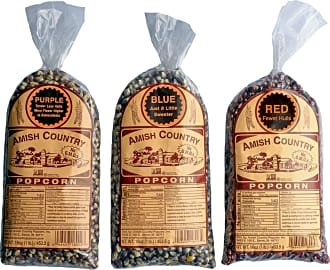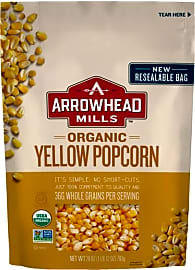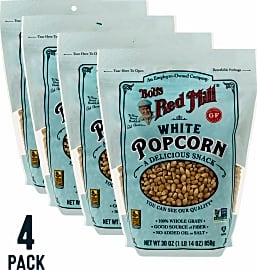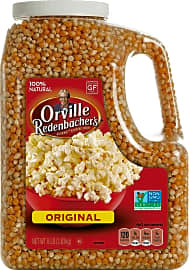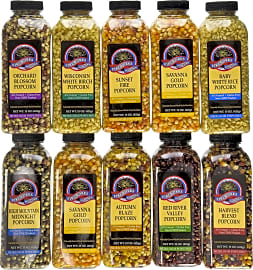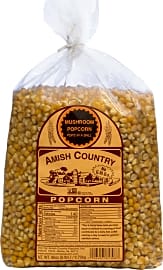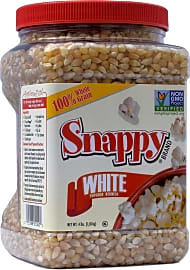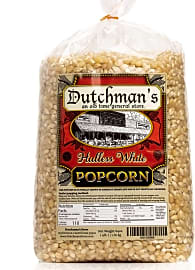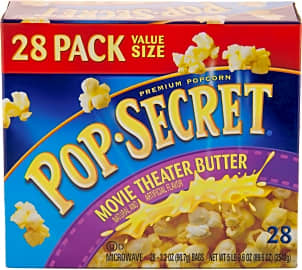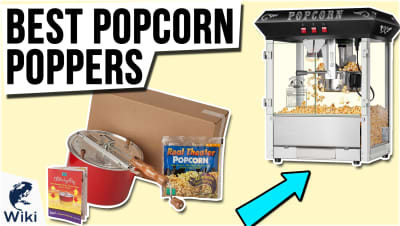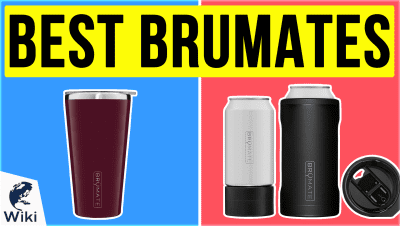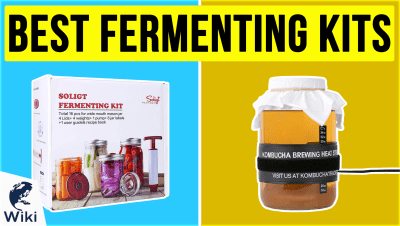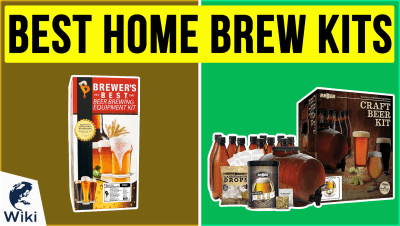The 10 Best Popping Corn

This wiki has been updated 42 times since it was first published in August of 2015. You don't have to wait for movie night or baseball season to enjoy a bowl or two of popcorn, as it makes for a nutritious and delicious snack at any time. Our list of popping corn includes options in a range of flavors and textures that pair well with a variety of seasonings, and they are all a lot healthier and lower in calories than potato chips, so you can enjoy them somewhat guilt-free. When users buy our independently chosen editorial choices, we may earn commissions to help fund the Wiki.
Editor's Notes
July 06, 2020:
Popcorn lovers know the nuances that can be found between white, yellow, and the lesser-known blue, red, and purple varieties of kernel, while some people just like traditional movie-style versions. We curated this list to serve tastes and preferences of all stripes and chose options that can be cooked in a variety of popcorn poppers with consistent, delicious results.
Today we said goodbye to a handful of items for varied reasons. When Bob's Red Mill Yellow and Arrowhead Mills Organic White became unavailable, we supplanted them with their yellow and white counterparts with Bob's Red Mill Whole White and Arrowhead Mills Yellow. We removed Hoosier Hill Farm Original due to complaints regarding its consistency and Franklin's Gourmet Natural, as it's very close to Great Northern Premium in flavor, except pricier for a smaller amount.
We added Snappy Brand White to provide another budget-friendly favorite on par with Orville Redenbacher's Original, and the Amish Country Pack to add more variety to our offerings alongside Fireworks Gourmet. Finally, we wanted to bring on a mushroom version, so you'll find Amish Country Old Fashioned joining the ranks as well. When cooked properly, these large kernels should create firm, round, slightly chewy balls that hang onto coatings very well, making them ideal for many recipes. Be aware though, that oftentimes "butterfly" pieces will sneak in, so don't be surprised if you see a few in your batch.
May 28, 2020:
Wabash Valley Farms and Riehle's Select have been removed due to quality and availability concerns. Amish Country Extra Small and Dutchman's Hulless, on the other hand, are new additions to the list, chosen for their superior flavor and satisfying texture.
Special Honors
Great Northern Red All-Star Cart Used for everything from home theaters to events held at churches, schools, businesses, and more, this popper is of commercial-grade quality and boasts an old-fashioned cart design. It has stainless steel food-zones and kettles for easy cleaning, a warming deck, old-maid drawers for unpopped kernels, and tempered safety glass panels. It operates quietly and comes with kernel and oil scoops and a reject kernel tray. greatnorthernpopcorn.com
The Popcorn Bowl with Kernel Sifter Once you've prepared your popping corn, this clever bowl designed by ceramicist Catherine Smith is ideal for serving it. It keeps rogue kernels from getting in the way thanks to a colander-inspired bottom that filters them out and stores them in a separate compartment for disposal. Crafted in Portugal, this server is made from durable, twice-fired, glazed stoneware. uncommongoods.com
What Exactly Causes Popcorn to Pop?
Take, for example, certain brands of popcorn that are sold inside a foil pan with an airtight hood that balloons as the contents are shaken over a flame.
There are several varieties of corn, and yet popcorn is the only type of corn that pops under extreme heat. Why is that? The answer is that inside of every popcorn kernel there exists a tiny droplet of moisture, far too minuscule to be seen by the naked eye. That moisture is protected by a hard-shell section of every kernel known as the hull.
As one or more popcorn kernels are heated, the moisture boils. This creates pressure inside the hull, increasing as the molecules scatter, based on the water turning into steam. Those molecules are the reason why you can see individual kernels of popcorn vibrating, or perhaps even jumping, just prior to the moment when they explode. That explosion results in a fresh, new piece of popcorn being born.
The more concentrated the heat, the quicker and more efficient the popping process will be. Take, for example, certain brands of popcorn that are sold inside a foil pan with an airtight hood that balloons as the contents are shaken over a flame. The foil cover helps to seal in the heat, and the intense shuffling encourages the pressurized kernels to explode. The same applies to cooking popcorn in a microwave, in that the radio waves zero in on beads of moisture, agitating every hull until it responds.
In both of these cases, there is a delicate balance between preparing a delicious bowl of popcorn, and overcooking the kernels. Popcorn can become charred if it is left cooking for even 1-2 minutes too long. The best advice is to turn off the heat as soon as the popping begins to taper. It is also important to maintain a vigilant eye throughout.
The Health Benefits of Eating Popcorn
If you are going to snack, you should snack healthily. While that often means replacing potato chips with a bowl of carrots or apple slices, the occasional bag of popcorn isn't such a bad choice. You might be surprised to learn that popcorn is lighter on your stomach than the majority of popular snack foods, for it isn't the kernel, but the added salt, butter, and other toppings that do your stomach little good.
Fiber-rich foods are proven to reduce a person's cholesterol, which, in turn, minimizes the risk of certain cardiovascular conditions, including diabetes, and arrhythmia.
Numerous studies have confirmed that a popcorn kernel's hull possesses a higher concentration of polyphenols than most fruits. Polyphenols promote strong tissue, while preventing the type of cellular deterioration that could eventually lead to heart disease, Alzheimer's Disease, liver disease, or cancer. Polyphenols are also a form of antioxidant, which means they can provide the skin with a youthful glow.
Beyond that, popcorn nourishes the body by way of whole grains, many of which can stimulate the brain. Whole grains contain B vitamins, along with vitamin E, protein, certain minerals, and fiber. One cup of heated popcorn, for example, contains a little over one gram of fiber. Fiber-rich foods are proven to reduce a person's cholesterol, which, in turn, minimizes the risk of certain cardiovascular conditions, including diabetes, and arrhythmia.
The best way to benefit from eating popcorn is by purchasing a plain (or original) variety, and then adding any seasonings yourself. Cheese popcorn, buttered popcorn, or other novelty popcorns are sure to be high in cholesterol, sodium, and fat. Plain popcorn, by way of comparison, remains a positive source of nutrients throughout.
A Brief History of Popcorn
The earliest-known evidence of popcorn dates back to 3,600 B.C.E. This fluffy snack was heated manually over an open flame until the 19th century, at which point manufacturers began cooking the kernels over a stove and selling the resulting product in bags. Nineteenth-century bags of popcorn were referred to as pearls in England, and nonpareil throughout Europe.
During the Reagan Era, compact microwaves enabled the American public to enjoy a family-sized helping of buttered popcorn directly out of the bag in three minutes or less.
The term popped corn was coined by Americans toward the end of the 1800s. Popcorn was especially popular in the United States, particularly as a snack enjoyed at public events or carnivals. The prevalence of popcorn increased dramatically after a Chicago candy store owner named Charles Cretors invented the first automatic popcorn maker in 1885. Cretors' invention allowed users to make more popcorn, faster, and it also could include additives during the cooking process. By the 20th century, Cretors had deployed steam-powered popcorn carts throughout the streets of Chicago. Popcorn was so inexpensive to produce that the popcorn cart immediately became a sensation.
Popcorn continued to flourish throughout the Great Depression, given that the portions were cheap, and, therefore, anybody could afford them. At the height of World War II, the American Government began to ration the country's sugar supply. This led to a temporary drought of candy and confectionery production. Popcorn sales, meanwhile, proceeded to skyrocket nationwide.
By the 1950s, theater owners were making an increased profit thanks to installing standalone popcorn machines along the sidewalls of their lobbies. Twenty years after, Orville Redenbacher revolutionized the industry by introducing household oven poppers that could be heated over a kitchen stove. During the Reagan Era, compact microwaves enabled the American public to enjoy a family-sized helping of buttered popcorn directly out of the bag in three minutes or less. Today, Americans consume an estimated 17 million quarts of popcorn every year. Illinois has named popcorn its official state snack in honor of Charles Cretors.


